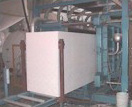EPS is a closed cell, resilient, light-weight, foamed plastic which has a density range between 1.0 and 3.0 pcf for most construction applications. Within that range EPS can be molded to achieve varying densities, providing the mix of strength and insulating properties to meet specific application requirements at minimum cost.
EPS has a successful 48 year history of efficient use in industrial, commercial, residential and low-temperature buildings. In Europe, where energy efficiency has long been a primary design consideration, architects have made EPS the dominant thermal insulation.
 Insul-Board utilizes the latest technology and equipment to manufacture a variety of standardized and customized products from its EPS. The production of finished goods from foam is accomplished through well established industry processing stages.
Insul-Board utilizes the latest technology and equipment to manufacture a variety of standardized and customized products from its EPS. The production of finished goods from foam is accomplished through well established industry processing stages.
 The foam starts out as tiny plastic grains that are expanded with inert gases and heat. The granules become bubbles of polystyrene that are 90% air. Once expanded to 40 times their actual size, the pellets are molded. They emerge from the machine as 16 to 24 foot blocks, weighing 180 to 560 pounds. The giant molded blocks can be cut to any size and shape needed.
The foam starts out as tiny plastic grains that are expanded with inert gases and heat. The granules become bubbles of polystyrene that are 90% air. Once expanded to 40 times their actual size, the pellets are molded. They emerge from the machine as 16 to 24 foot blocks, weighing 180 to 560 pounds. The giant molded blocks can be cut to any size and shape needed.
 Insul-Board's quality molded blocks are used for many applications, most of which require the blocks to be trimmed and cut to a desired dimension. Insul-Board utilizes a series of thermal hot wire cutting tools to accomplish a smooth surface cut while still maintaining strict quality control dimensional tolerances. The wires are drawn down through the block to achieve the length and width cuts and then the blocks are pushed through the hot wires via a conveyer to achieve the desired thickness.
Insul-Board's quality molded blocks are used for many applications, most of which require the blocks to be trimmed and cut to a desired dimension. Insul-Board utilizes a series of thermal hot wire cutting tools to accomplish a smooth surface cut while still maintaining strict quality control dimensional tolerances. The wires are drawn down through the block to achieve the length and width cuts and then the blocks are pushed through the hot wires via a conveyer to achieve the desired thickness.
A major use of EPS is as a packaging material. It can be used in rigid shapes designed to fit closely around an item such as a television set or as small pieces as a cushioning material to fill the space around products in a box.
 EPS is used within the car, electrical goods, construction and leisure industries as well as many others. EPS is widely used in the construction industry to keep buildings warm (or cold!) and to reduce impact noise levels. It is produced in large, rigid, lightweight sheets which can be easily fixed to walls, ceilings and floors. Being so light in weight means that it is easy to fix and carry around the building site. It is also easy to cut with a fine tooth saw, knife or hot wire. EPS panels that are placed in the cavity of a house wall will reduce heat loss up to five times that of a wall with no insulation.
EPS is used within the car, electrical goods, construction and leisure industries as well as many others. EPS is widely used in the construction industry to keep buildings warm (or cold!) and to reduce impact noise levels. It is produced in large, rigid, lightweight sheets which can be easily fixed to walls, ceilings and floors. Being so light in weight means that it is easy to fix and carry around the building site. It is also easy to cut with a fine tooth saw, knife or hot wire. EPS panels that are placed in the cavity of a house wall will reduce heat loss up to five times that of a wall with no insulation.
EPS can also be used to improve impact sound insulation in office blocks with solid concrete floors by damping impact vibrations. Large slabs can be laid quickly with no special equipment.